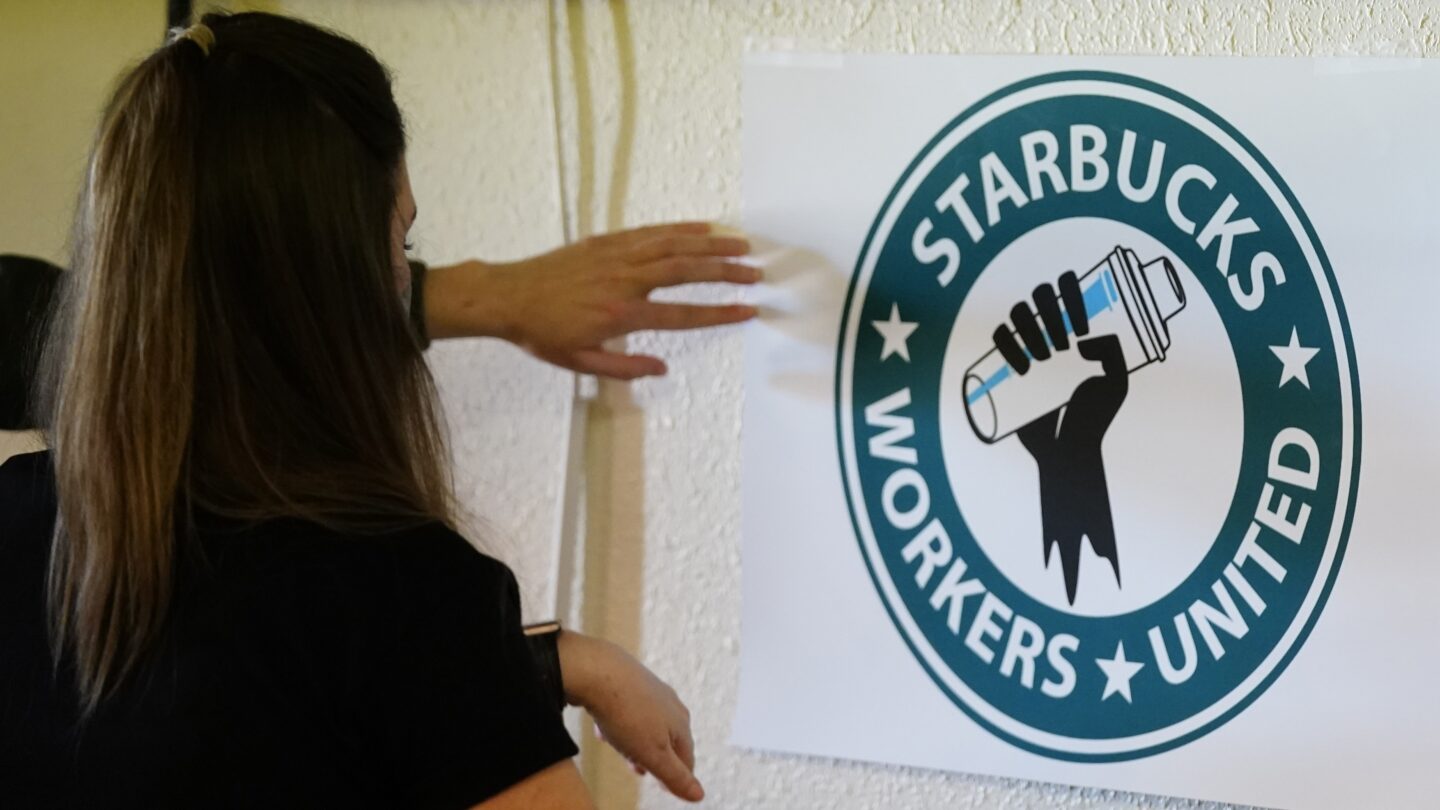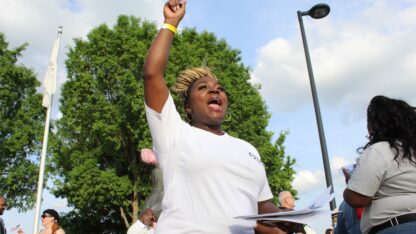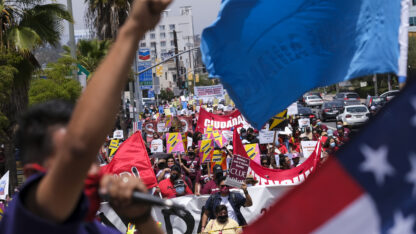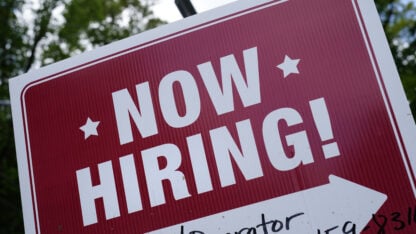A month after his return to Starbucks as interim CEO, Howard Schultz has announced new benefits, including expanded training, improved sick leave and credit card tipping for some 240,000 Starbucks employees at more than 8,800 stores across the country — but not for those that are unionizing.
“We do not have the same freedom to make these improvements at locations that have a union or where union organizing is underway,” Schultz said on a conference call with shareholders on Tuesday.
Starbucks said all employees, including those at stores that are unionizing, would receive the wage hikes that were first announced last October. On August 1, employees will get either a 3% raise or $15 dollars hour, whichever is higher, and tenured hourly employers will get even bigger raises.
The announcement comes as more than 230 Starbucks stores have filed petitions for union elections and about 50 stores have voted to join the national union Workers United since December, making it one of the most significant union drives in America.
Schultz hinted that Starbucks might move to exclude unionized stores from new benefits in comments to store managers over a video call in mid-April. At the time, he said he had just learned that Starbucks is not permitted by law to offer new benefits to a store that voted for a union while they are in the collective bargaining process.
Workers United called Schultz’s assertion “dead wrong” and filed unfair labor practice charges with the National Labor Relations Board.
“Under Section 8(a)(5) [of the Fair Labor Standards Act], employers simply cannot implement new benefits during contract negotiations unilaterally,” wrote Gabe Frumkin, counsel for Workers United. “Instead, they must bargain with the union if they wish to implement new benefits programs.”
In the filing, Frumkin charges that Schultz misrepresented the law by giving the impression that Starbucks could not even offer such benefits to the workers or their union representative. Schultz’s comments had an immediate and profound chilling effect on organizing campaigns nationwide, Frumkin wrote.
Schultz says no union contract measures up to what Starbucks already offers
The union drive at Starbucks has been remarkable, not only because of the stunning speed at which it has spread but also because food and drink establishments are among the least unionized in the country, with just over 1% of the sector unionized in 2021, according to the Labor Department.
But unlike many other food and beverage chains, Starbucks has long prided itself on being a standout employer, offering health care, retirement, stock options and free college tuition to full-time and part-time employees, referred to as partners at Starbucks. Indeed, the generous benefits and socially progressive culture are a big part of what has drawn many workers to Starbucks, which has some 9,000 stores nationwide.
“Compare any union contract in our sector to the constantly expanding list of wages and benefits we have provided our people for decades, and the union contract will not even come close to what Starbucks offers,” Schultz said on Tuesday’s shareholder call.
As he’s pledged transformation at Starbucks, Schultz says outside forces are driving union campaign
Upon his return to the company, Schultz acknowledged that Starbucks had to transform. Over the past month, he’s traveled to different regions to attend what he calls “co-creation” sessions with store employees, referred to as partners at Starbucks, hearing them out on problems they encounter on the job as well as scheduling and pay issues.
“It was difficult and emotional at times to hear the challenges and the issues that partners are facing,” Schultz told store managers in a video call last month.
But in the shareholder call on Tuesday, Schultz made clear that he thinks the source of workers’ grievances may have less to do with Starbucks and more to do with events that have shaped workers’ lives, from the Great Recession to the global pandemic.
“These young people have completely valid concerns given today’s uncertainty and economic instability,” he said. “They look around, and they see the burgeoning labor movement as a possible remedy to what they are feeling.”
It was a toned-down version of comments he made last month, when he spoke of “companies throughout the country being assaulted, in many ways, by the threat of unionization” and referred to the Starbucks union drive as a “new outside force trying desperately to disrupt our company.”
That characterization has riled Starbucks workers who say they are the ones leading the unionizing efforts at their stores, not some “outside force.”
Schultz has spoken of organizers intentionally and aggressively sowing divisions within the company while “attempting to sell a very different view of what Starbucks should be.” He said he’s heard of stories of employees who did not support the union being bullied into not voting in elections. Pointing to the low turnout in-store elections, he urged store managers to encourage all workers to vote.
In pushing the “outside force” narrative, Schultz could be referring to one particular worker in Buffalo, where the Starbucks union campaign got its start. Before landing a barista job with Starbucks in 2020, Jaz Brisack, a Rhodes Scholar from the University of Mississippi, had worked as an organizer with the UAW in Mississippi and with Workers United in Buffalo, where she led an effort to organize baristas at a local coffee chain.
But workers at Starbucks stores across the country describe being inspired by the baristas in Buffalo, not directed by them. While Workers United lawyers are helping store workers file petitions for union elections and unfair labor practice charges, the workers say they are the ones reaching out to coworkers across shifts and deciding what it is they want as a store.
Starbucks workers condemn Starbucks’ “union-busting” activities
All but a handful of the more than 50 Starbucks stores that have held union elections to date have voted to unionize.
An election in Springfield, Virginia, in April ended in a 10 to 8 loss, a result that Workers United is challenging.
Gailyn Berg, a shift supervisor who led the union campaign at their store, believes Starbucks’ “union-busting” activities in fact changed votes, pointing specifically to managers’ warnings about what could happen if the store voted to unionize.
“We weren’t going to be able to get raises in the next coming months. We’re not going to be able to work at other stores. Definitely our partners believe that,” Berg said.
Berg says those warnings were delivered through mandatory sessions between managers and employees, known as captive audience meetings, although Starbucks denies that the meetings were mandatory. The National Labor Relations Board has moved to ban captive audience meetings as an unfair labor practice.
Starbucks denies engaging in illegal anti-union activities, including at other stores where worker organizers have been fired. Starbucks says the workers in question were fired for violating company policies. The NLRB has issued formal complaints against Starbucks in a couple such cases, calling the actions were retaliatory. In Arizona, the NLRB has sued Starbucks to have three workers reinstated.
Copyright 2022 NPR. To see more, visit https://www.npr.org.
9(MDAxODM0MDY4MDEyMTY4NDA3MzI3YjkzMw004))

9(MDAxODM0MDY4MDEyMTY4NDA3MzI3YjkzMw004))








